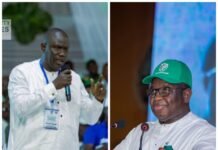By Ranger
For better or for worse, real political life is expressed in the media – newspaper columns, radio stations, and TV studios than in Parliamentary assemblies or during partisan activism.
This idea, which stresses that one cannot talk about democracy without highlighting the necessity for a free, trustworthy, responsible, and credible media, is held by many who subscribe to democratic ideals.
It is also true that democracy, aside from Freedom of the Press, regular organization of free and transparent elections, separation of powers, a Parliament that controls Government action, a fair Judicial system, or a Government that fulfills its promises to the people, also requires other commitments to grow.
In fact, 21st-century democracy also implies incorruptibility of the Government and the greater responsibility to resist all temptations to abuse power.
It signifies transparency and accountability in a manner that enables citizens to know what Government wants to do on their behalf, and how they want to do it, plus access to public information and administrative documents.
In this light, in ensuring good governance, the power and influence of the media lie in its ability to give information and provide an easy means of communication easily across time and space by reaching a lot of people with credible news, views, and information.
Because of this, the influence of media has become so powerful today because it can easily influence people positively or negatively.
In helping to ensure good governance, the media gives political parties the tools to reach large numbers of people and inform them on key issues ranging from policies to elections. Thus, the media can be seen as an enabler for democracy by helping to create better-educated voters which would lead to a more legitimate Government.
Furthermore, in ensuring good governance, advances in communication, largely through the internet, have improved community access to information.
Therefore the media plays an important role in society as a source of information, but also as a “watchdog” or scrutinizer.
With the country having a largely youthful population, the media importantly can also affect youth’s thinking, attire, attitude, and so on by providing them with the right information, education, and entertainment. Media development plays a role in democracy and effective democratic discourse through supporting free and independent media. Alongside these functions of the media should go media development which involves capacity building for institutions or individuals related to Freedom of Expression, pluralism, and diversity of media as well as transparency of media ownership.
It must be reiterated that the most important function of the media is to disseminate news to the masses concerning vital occurrences or important information. That way, the media can play a very positive role in shaping the moral, ethical and spiritual outlook of society?
This positive role of media can increase the media space, highlight political engagement, and develop awareness in the public because through that we can share information with the help of mass communication.
The media can also bring out hidden talents, as well as bring out public opinion about certain events and current issues.
On the other hand, the negative effects of mass media on society can lead people towards negative attitudes including violence, racism, tribalism, and political chauvinism which can be a threat to social unity, harmony, and peace.
For example, political thugs can be incited and get carried away from the rumors spread on the internet.




